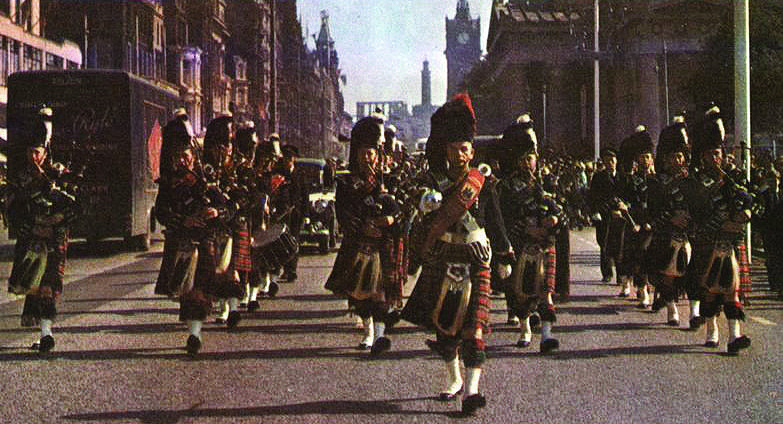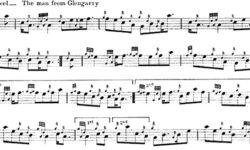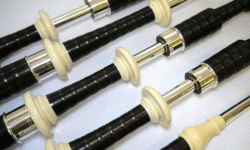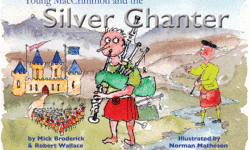
This is from the Piping, Drumming and Highland Dancing Journal of 1949. The author was appointed President of the SPBA in 1947, and during the year until February 1948 carried out the duties of President and Secretary. On the latter date he was appointed Secretary of the Association. He points to a burgeoning number of contests post WW2 and the need for more money and teaching for bands. In the photograph bands parade down Edinburgh’s Princes Street to publicise the first SPBA Worlds in 1947…
With the encouraging growth in the number of pipe bands today, it becomes increasingly necessary for the Scottish Pipe Band Association to formulate a policy of constructive development in an effort to avoid an obvious chaotic future for the National Instrument of Scotland.
It is not my intention to give an historical survey of the formation and gradual progress of the Association since it was inaugurated in 1931. Neither do I wish to condemn without being able to offer a solution. My intention, therefore, is to expose the faults and, in so doing, prepare the way for the future. Let me begin by dealing with the problems which immediately confront us.
By Mr R C WHITELAW MBE
Since the end of the War, two important factors loom ominously in front of us, both of which demand our immediate attention and remedial action. They are (a) the increase in the number of pipe bands and pipe band contests, together with the haphazard manner in which these contests are culminated by a spectacle called ‘Massed Pipe Bands’, and (b) the lack of proper system of control and teaching of the bands. Before attempting to deal with the future, let me analyse the two main problems which are presently in our midst, and which will worsen gradually unless checked now.
First. In spite of the acute shortage of materials to make new uniforms and replace old ones, I believe the spectacular display, coupled with the theory that ‘the bigger the band, the bigger the noise’, has evoked a desire on the part of many ‘well-meaning’ enthusiasts to encourage the formation of pipe bands in every locality.
The sad part of it all, however, lies in the fact that the newly-formed bands proceed to practice and train on similar lines to those of our grandfathers forty or fifty years ago. Then, as now, the Pipe-Major, with a knowledge of piping only, assumes complete control of the newly-formed band.
[wds id=”2″]
He enrols new pupils and enlists the support of the more experienced players. It would not be too bad if he would content himself with that, but instead we invariably find him dictating to the drummers and emphasising his ‘knowledge’ of pipe bands by telling them that their job in the band is to keep ‘time’ and nothing else.
With such a foundation the band grows up and in a very short time enters for the various contests. Is there any wonder that a band with such a foundation should struggle to be retained in Grade III? I do not fully blame them. On the contrary, I switch the blame to the Pipe Band Association and the other piping societies, so many of whom are too sophisticated and high-brow to ‘lower’ their status to that of a pipe band.
For too long have we stood idly by and watched the struggles of our colleagues in an effort to maintain the standard of pipe bands. Never once has any attempt been made to promote a scheme of mutual aid, encouragement and support for the newly-formed bands whose future is doubtful immediately they set foot on the contest field.
The Pipe Band Association only touched the surface of this problem when the system of grading was introduced, which was tantamount to saying – ‘Your quality is too poor to compete against us. Fight it out among yourselves in your own grade and as soon as you meet with some success we will upgrade you‘ – in other words, we will take the wind out of your sails for a while. And so this vicious struggle has gone on for so many years.
Not only did the enthusiasts show their devotion by encouraging the formation of new pipe bands, they went a stage further in some cases and encouraged the promotion of pipe band contests. I wonder why they took this second step?
I make no bones about it when I say that many promoters make contact with me and quite bluntly state they are anxious to raise money for some purpose or other, and would I be willing to help them to run a pipe band contest. Herein lies the crux of one problem – the increasing number of pipe band contests.
I am keen and anxious to encourage any scheme for the furtherance of pipe band culture, but I must confess to a feeling of resentment at the thought of our bands being used commercially. I do not think people generally appreciate the amount of work, worry and expense to which the pipe bands are committed while practising, meeting the increased cost of band accessories, and the expense involved in travelling to contests, not to mention loss of earnings by competitors.
I am not trying to discourage the competitive system. Nevertheless, I do know that many bands and their management committees feel very disappointed when at the end of each year they discover that all their hard-earned weekly contributions have been spent, with nothing to show in return.
It appears, however, that enthusiasm alone gives them the courage to prepare for and to do the same thing next year. I have the feeling that in the very near future, if our bands are to be used as a means of raising money, the first charge on the gate receipts must be to pay part or all of the travelling expenses of the bands taking part.
I am rather perturbed when I study the balance sheets of many contests, and see the profits that accrue. Yet the people who make them – the bands – have actually spent their hard-earned money in their enthusiasm to enable the showing of such profits.
We must face the facts. Only a few bands receive in prize money a contribution towards their expenses, while the remaining bands are rewarded by that thing called the ‘thrill of competing’. If the contest promoters cannot agree to pay part or all of the travelling expenses to the non-prize winning bands, then surely it is reasonable for the Association to expect, nay demand, that the prize awards shall be taken to the eighth, ninth, or even tenth place in each grade of the contest.
- To be continued.
-
 Classic Strathspeys & Reels – Vol. 1 (A – F)£2.50
Classic Strathspeys & Reels – Vol. 1 (A – F)£2.50 -
 Bagpipes – DN4A – High Quality Set in Plain SilverPrice range: £200.00 through £2,052.00
Bagpipes – DN4A – High Quality Set in Plain SilverPrice range: £200.00 through £2,052.00 -
 Young MacCrimmon and the Silver Chanter£8.50
Young MacCrimmon and the Silver Chanter£8.50















